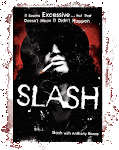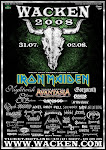

Nick Hipa: Guitar
Tim Lambesis: Vocals
Jordan Mancino: Drums
Phil Sgrosso: Guitar
The members of AS I LAY DYING are the kind of musicians that refuse to be measured solely by their most recent accomplishments. The new album, An Ocean Between Us, is evidence of this fact, proving once again that these guys are not afraid to push the limits of their sound and always keep things moving. The music grabs you by the throat and doesn’t let go until the album’s finish. Building upon the foundation that AILD has laid over the past several years, growing from a small San Diego outfit slowly and deliberately into a priority national act, the band has become Metal Blade Records’ biggest sellers with an extremely devoted following. AS I LAY DYING has the goods to take it all the way and stake their claim as the metal band “ you need to know about” in 2007 and beyond.

A brief history lesson: AILD’s Metal Blade debut, 2003’s Frail Words Collapse, effectively introduced this indie band to the world on the strength of the catchy but brutal songs, “94 Hours” and “Forever.” The album went on to be a label best-seller, surpassing 210,000 units sold. The follow up, Shadows Are Security, further spotlighted AILD as one of most influential bands to break out of the underground metal scene. Their high-profile, marathon tour cycle found the band as one of the featured attractions on the Ozzfest 2005 side stage, then as part of the second annual Taste Of Chaos trek in winter 2006 along with Deftones and Thrice, culminating in the headlining slot on the 2006 Sounds Of The Underground tour in front of 3000-5000 people per night. Shadows has sold nearly 275,000 records to date as word of the album and the band’s electrifying live show continues to spread through their ever growing fan base, fans that simply put are in it for the long haul.
Now, with An Ocean Between Us, the stakes have been raised, the ante upped. “It may have been comfortable for us to write a similar sounding record,” admits vocalist and founding member Tim Lambesis. “The basic elements of AS I LAY DYING are there, but on the whole, we took certain songs in a new direction. We can’t always do what’s comfortable or just do more of what our fans expect. We wanted to have more depth.” To achieve the desired depth, the band wrote and recorded as though their very lives depended on it. Lambesis says, “Everything was performed more spot-on than any of our previous records. The biggest focus was the songwriting. It’s more dynamic than previous records, and that helped the production sound bigger because there are ups and downs.” The band recruited noted producer (friend and Killswitch Engage guitarist) Adam Dutkiewicz to man the boards. Colin Richardson’s mixing skills also helped create the album’s bigger, fuller, crisper, and more dynamic sound. On An Ocean Between Us, driving melodic choruses are set to a backdrop of breakdowns, the kind that ignite moshpits to the apex of fury. Richardson named the record among his favorite, telling fans “It is brilliant, people! Amazing songs all over the place. It's a truly special album and Jordan [Mancino] has to be one the THE best drummers in metal. Seriously. It was a real honor to mix this album."
Musically, the core four –Lambesis, drummer and fellow founding member Jordan Mancino, guitarists Nick Hipa and Phil Sgrosso- wrote the album, and recruited bassist Josh Gilbert to record and fill the vacant bass position. Lambesis admits that on this album, the foursome where able to commingle all of their strengths. “From the start of this band Jordan and I were always the solid two members. Together we wrote a majority of the songs and were very passionate about every decision the band made. While we always expected that same passion from other band members, we didn’t always receive it. It wasn’t until Phil and Nick joined the band that we were finally able to find the other solid two.” Lambesis also feels the band played to everyone’s strengths when writing, making the process natural. He says, “We were conscious about focusing in on things. Like if we wanted Phil’s guitar melody style to be the showcase of the song. Or if we wanted to go towards the darker, thrashier songwriting style, we’d focus on that. We focused on separate strengths, so songs came out drastically different and it sounds more diverse.” Another musical step occurred on the song “Nothing Left.” Lambesis says the song was a step forward for him personally, because when demoing the song, he had to sing the clean background vocals to get a feel for how he wanted it to go, not because he particularly wanted to sing that part. He says, “It was my first time singing a chorus, and it’s now one of my favorite choruses, and not because I sing it, but because it has a unique feel.”
While Shadows Are Security was a concept record, Lambesis admits that An Ocean Between Us is more lyrically diverse, something that he did with purpose. “I tried to write about whatever was on my mind,” the singer reveals. “I did not have a certain conceptual direction, but because I tend to focus on certain topics, the album has a bit of a theme,” he reveals. “The title is about the separation we need to have between the expectations of the rest of the world and what our goals are. There are dreams we’re taught are normal, whether it’s money or success or any of those things, but we shouldn’t believe in those things if they are not important to us. There is an ocean between our real lives and what is expected of us.”
One thing that can’t be denied is the devotion and loyalty that AILD constantly receive from their fans. In fact, every time that AILD is up for some award that is voted on by the public, AILD’s fan’s never disappoint. The band has taken home the San Diego Music Award’s 2006 Artist of the Year (beating out Jason Mraz and Switchfoot) as well as being voted 2006’s Metal Gods by MTV2. One of the reasons that fans have latched on to AILD so passionately and fervently is that the band always has something thoughtful and positive to say while still playing a combustible, aggressive style of music. Instead of dwelling on what’s wrong with the world, they’re more interested in putting a positive spin on the obstacles that life throws your way. “For a long time in the metal scene, the lyrics weren’t easy for fans to relate to, on a personal level,” Lambesis says. “If you’ were angry, you listened to metal, but there was no positive advice or lyrics that inspired you to overcome struggles. That didn’t exist until more recently. We’d like to think that we’re a band that many younger people can relate to.”
With a fanbase that continues to grow exponentially, AILD plan to focus on what they know best, hitting the road. With a tour schedule that includes the US, Canada, Europe, Japan and Australia, they know that there are always new fans that haven’t been exposed to the music. “We’ll keep pushing forward,” Lambesis says. “There is always a chance for us to do more, even with more people that don’t necessarily listen to metal.” Thanks to their keen sense of melody that allows their songs to continually take up real estate in your brain, AILD is confident about winning over these new fans. Without question An Ocean Between Us is the right record to capture their attention.
Lambesis has always seen AS I LAY DYING as a metal band that still has a great deal of punk and hardcore influence in both their music and ethics, something that also draws different people to the band. “I’ve always appreciated how punk music has such a strong sense of melody, but with really fast beats,” Lambesis says. “Those melodies and tempos can also be found in our songs...just don’t let the double bass fool you. Also a large part of our melody comes from the guitars (as opposed to the vocals), something we have become known for. And beyond the music, I’ve always felt like we come from a punk and hardcore ethic as well, something that is embedded in the way we approach our music careers. As a band, being passionate about what we do and having meaning behind our music, that’s what we’re about. It’s not just mindless, mass marketed pop music. For me personally, within the band, and within my life, I want to stand up for what I believe in. That’s more important than the success or the popularity that comes from being in a band.”
With An Ocean Between Us, AS I LAY DYING are definitely on to something special. And with a touring schedule that would make the circus jealous, you can rest assured that AS I LAY DYING will be leaving an even bigger mark in 2007 and beyond.






























